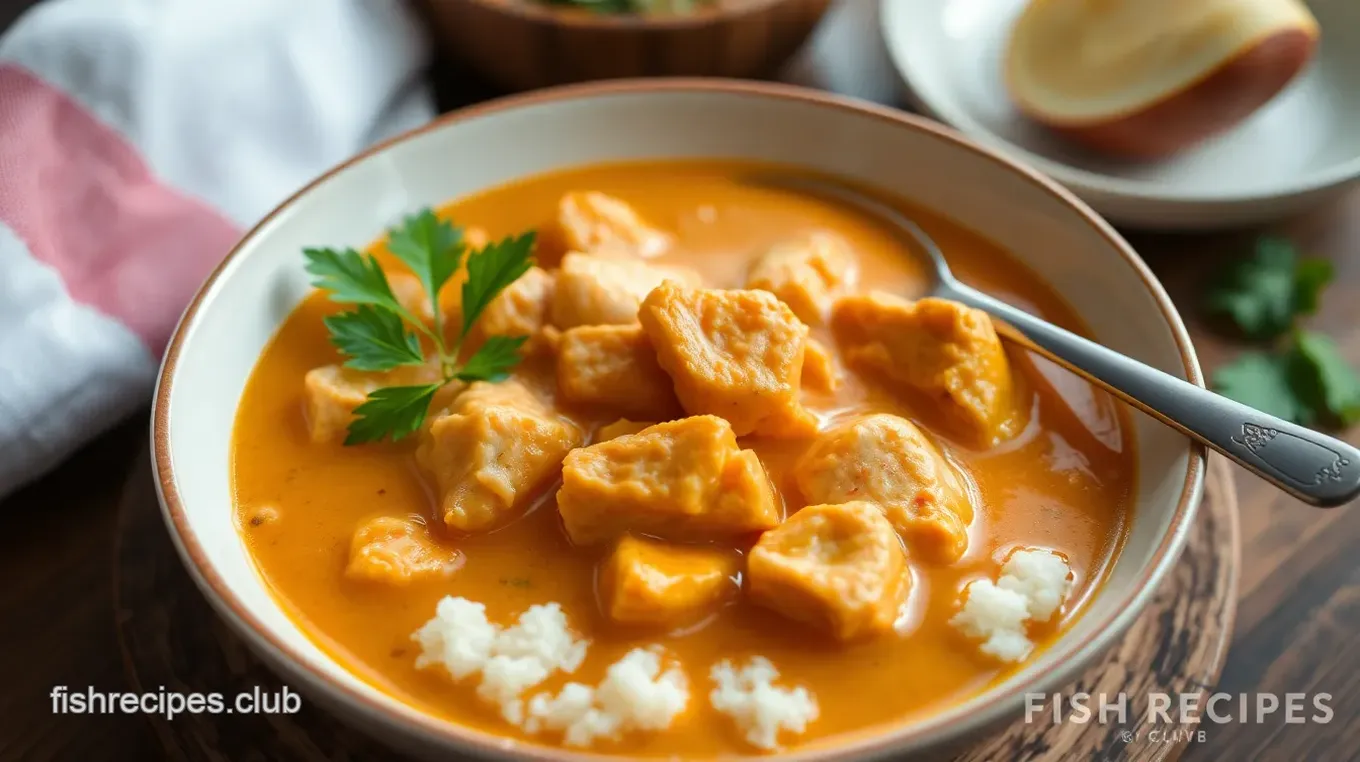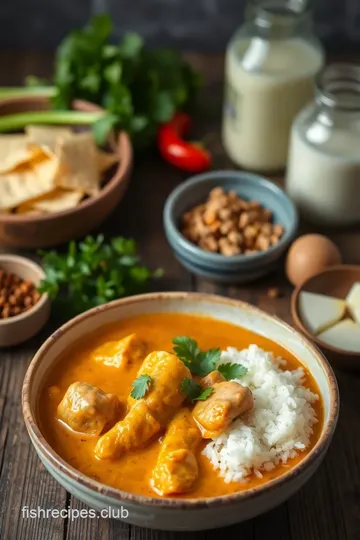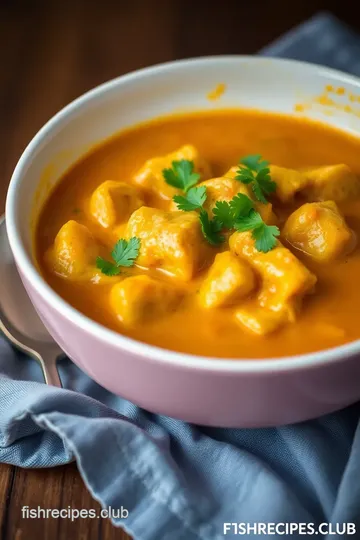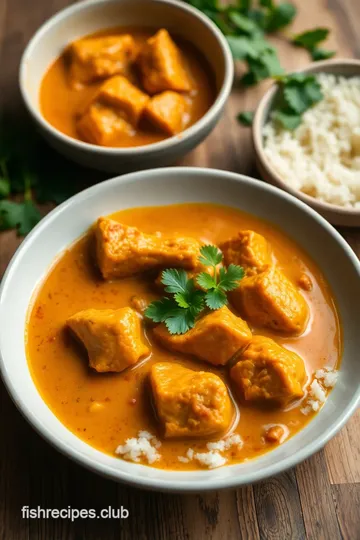Quick Panang Chicken Curry with Coconut Milk
Craving a cozy dinner? This Quick Panang Chicken Curry with Coconut Milk is your answer! Rich, creamy, and full of vibrant flavors, it's ready in 30 minutes. Let's cook!

- Essential Ingredients Guide: Cook Up a Storm!
- Essential Preparation Steps
- Step-by-Step Process
- Expert Techniques
- Success Strategies
- Pro Tips & Secrets for Quick Panang Chicken Curry with Coconut Milk
- Perfect Presentation
- Storage & Make-Ahead
- Creative Variations
- Complete Nutrition Guide
- Expert FAQ Solutions
- Wrapping It Up
- Recipe Card
You know that feeling when you come home after a long day, totally wiped out, and all you want is comfort food that doesn’t take hours to make? well, that’s how my love affair with quick panang chicken curry with coconut milk started.
Picture this: it’s a tuesday evening, and the last thing i want to do is slave over a stove. but then, i remember—i can whip up this delightful thai chicken curry in under 30 minutes! oh my gosh, it’s a lifesaver!
You might be wondering, what’s the deal with panang curry? well, let me tell you, it’s a creamy dream come true! originating from central thailand, it’s known for its rich texture and spicy-sweet flavor, making it an instant favorite.
With ingredients like coconut milk and kaffir lime leaves , this dish packs a punch of flavorful chicken happiness that’ll transport your taste buds straight to a bustling thai street market.
Recipe Overview
Now, let’s dive into why this quick panang chicken curry is the perfect fit for now. historically, panang curry features a marvelous balance of spices and coconut, making it a staple in thai cuisine .
Today, its popularity has skyrocketed among home cooks looking for quick, luscious meals. seriously, who doesn’t want to impress the family without breaking a sweat?
In about 25 minutes , you’ll go from chopping veggies to serving up a hearty meal—talk about a weeknight dinner idea ! plus, it’s just the right amount of medium difficulty .
As long as you can chop and sauté, you’re golden!
And let’s chat about cost—this recipe won’t break the bank. the usual chicken, bell peppers, and coconut milk combine to yield a piping hot dish that’ll happily feed four people.
So, ready your taste buds!
Key Benefits
Now, let’s get into the good stuff! first off, this dish is loaded with health benefits. coconut milk is a wonderful ingredient packed with good fats, which help keep you full and fuel your body.
Plus, there’s a solid dose of protein from the chicken, making it a great choice if you’re after healthier curry alternatives .
What’s more, it’s the ideal dish for special occasions or when you’re just craving a plate of joy. honestly, serving this to friends or family feels like you’re giving them a big, warm hug! and don’t even get me started on how it compares to those run-of-the-mill simple curry recipes you might find.
This recipe’s depth of spice and creaminess is a game changer!
For those who might want to mix things up, it’s super adaptable. you can easily swap in tofu for a plant-based curry or go wild with other thai curry ingredients .
And with minimal effort, you get all the thai cooking techniques you need to impress even your foodie friends.
Ready to get cooking? let’s chat about the ingredients you’ll need to create this delightful 30-minute meal that blends comfort food recipes with exotic flavors.
Grab those shot glasses—i mean, measuring cups—because it’s about to get delish in the kitchen!

Essential Ingredients Guide: Cook Up a Storm!
Hey there, food lovers! wanna whip up an easy chicken curry that tastes like you've spent hours in the kitchen? i'm talking about a quick panang chicken curry with coconut milk that’ll wow your friends and fam on a weeknight! before we dive into the how-to , let’s chat about some essential ingredients that’ll be key to this delicious journey.
Premium Core Components
First things first— quality ingredients matter! when you’re tackling any recipe, especially something like thai cuisine, you want the good stuff.
So, here’s the rundown of what you'll need, including some handy tips:
-
Chicken thighs (1 lb / 450g) : you’ll want the boneless, skinless kind. these babies are juicy and tender. if you can’t find them, chicken breasts are an okay substitute, but they may end up drier.
If a-bomb flavor is your goal, stick with thighs!
-
Coconut milk (1 can / 14 oz / 400 ml) : get the full-fat version for that dreamy creaminess that sings in your mouth! when you’re shopping, a thick, creamy texture is a good quality indicator.
-
Panang curry paste (2 tbsp / 30 ml) : you can usually find this in the international aisle. look for vibrant colors; a quality paste should smell heavenly.
No access? a red curry paste works too, but just a heads up , it'll taste different.
Make sure you’re storing these goodies right too. The coconut milk? Once you crack that can, store it in the fridge and use it within about 3 days.
Signature Seasoning Blend
Now, let’s spice things up! The magic of Thai cuisine is in its signature blends:
-
Kaffir lime leaves : (1-2, torn) these fragrant leaves are like a secret weapon. tear them before adding to unleash that zesty aroma.
If you don’t have any, finely zested lime can sub in.
-
Fish Sauce (1 tbsp / 15 ml) : That umami flavor is a must in Thai cooking! If you're going meatless, a little soy sauce or tamari can do the trick.
-
Fresh Basil or Cilantro : A sprinkle at the end brightens everything up. Fresh herbs are essential—brittle, sad dried ones just won’t do!
Smart Substitutions
Hey, life happens, right? You may not have everything on hand. Here’s where these smart substitutions come in handy:
-
Common Alternatives : Can't find Panang curry paste ? Regular red curry paste can save the day, though it's a different flavor profile.
-
Dietary Modifications : For a plant-based option, swap out chicken for tofu or a mix of veggies like bell peppers and zucchini. Trust me; it's still a winner!
-
Emergency Replacements : If you realize you're out of fish sauce, don't panic! Just use soy sauce or a splash of Worcestershire sauce instead.
Kitchen Equipment Essentials
Okay, before you get jiggy with the stirring, you need some basic tools:
-
Large Skillet or Wok : You need something that can handle all the sautéing and simmering you'll be doing. A deep skillet works, too.
-
Chef’s Knife & Cutting Board : You know the drill—these are your trusty sidekicks for ingredient prep.
-
Wooden Spoon or Spatula : For mixing it all up without scratching your non-stick surface, these babies are a must!
Storing leftovers? Empty mason jars or airtight containers will keep things fresh in your fridge.
Alright, you’ve got Thai Curry Ingredients and the tools lined up. Ready to vibe with those flavors?
Now, it’s time to jump into the magic segment— instructions . You've got this, and I’ll be right here cheering you on. Let’s make that Creamy Panang Curry happen!
Essential Preparation Steps
Getting into professional cooking, whether for yourself or to impress your friends, starts with the basics. i can’t stress enough the importance of mise en place .
It’s a fancy french term that simply means "everything in its place." chop your chicken, slice your veggies, and measure out that 2 tablespoons of panang curry paste before you even think about firing up the stove.
This way, you won’t scramble like a chicken with its head cut off when it’s time to cook.
And here’s a hot tip for mastering your time management: set a timer! whether you're cooking a quick panang chicken curry with coconut milk in 30 minutes or whipping up a slow-cooked stew, timing is key.
Start with the prep timer at 10 minutes before you dive into cooking. this keeps you accountable.
Keeping your kitchen organized can be a game-changer, too. use separate bowls for your chopped ingredients. trust me, your sanity will thank you when you're not digging through a jumble of stuff.
And, oh, let's not forget safety! always keep a clean workspace. a cluttered counter is a recipe for disaster (literally).
Use those cutting boards properly and keep things tidy to dodge any nasty accidents.
Step-by-Step Process
Alright, let’s break it down step by step.
-
Prep the ingredients: everything should be prepped before you hit the stove. that means cutting your 1 lb of chicken thighs into bite-sized pieces.
You want them good and uniform. slicing the red bell pepper and trimming the snap peas should only take about 2- 3 minutes if you’re quick.
-
Sautéing the aromatics: heat your skillet on medium and toss in the 2 tablespoons of panang curry paste . sauté that bad boy for about 1- 2 minutes until it starts to release those fragrant aromas.
Oh gosh, it makes your kitchen smell heavenly!
-
Add chicken: stir in your chicken and cook it until it’s no longer pink. this takes about 5 minutes .
Make sure to keep stirring to prevent sticking. who wants burnt chicken, right?
-
Create sauce: now for the magic part! pour in 1 can (14 oz) of coconut milk and let it simmer for 5 minutes .
Add in the fish sauce and brown sugar . stir well—it should smell like a tropical vacation!
-
Incorporate Veggies: Toss in your bell pepper and snap peas and give it another 3- 4 minutes on the heat until the veggies are bright and tender.
-
Finish & Serve: Taste it—seriously. Adjust seasonings as needed. Finish off with a sprinkle of fresh basil or cilantro for that extra flair! Serve it hot over jasmine rice.
Expert Techniques
When you're diving into thai cooking techniques , you want to pay attention to those critical steps. for example, achieving that creamy texture in your creamy panang curry relies heavily on the quality of coconut milk .
Look for the full-fat kind; those healthy fats are what make it so delicious.
Quality checkpoints are just as crucial. you’ll want a bright and vibrant green from those snap peas and a rich, golden color from the curry.
If the dish tastes flat, you might need to balance it out. a dash more fish sauce or a bit of sugar can often save the day.
And if you find yourself in a bind—maybe you accidentally burned the curry paste or your chicken is taking forever to cook—don’t panic! just adjust the heat or add a splash of water to loosen things up.
Cooking is all about those troubleshooting tips we learn through trial and error.
Success Strategies
Now let’s talk about common mistakes to avoid because we’ve all been there! overcooking your veggies? yikes. they should be bright and slightly crunchy—not mushy messes.
And for the love of thai cuisine, don’t skip the basil garnish! it adds a fresh pop that’s crucial to the flavor profile.
Quality assurance is a must, so trust your taste buds! perfect results come from tasting as you go. if you find you need a little more kick, that’s where those kaffir lime leaves come in handy.
They’re simply magical!
And here’s a cool idea: if you want to enjoy this delightful dish throughout the week, make a larger batch and refrigerate.
The flavors deepen and become more pronounced after a day or two. it’s like hitting the jackpot on those easy weeknight meals !
So there you have it, folks! a well-rounded guide to crafting your very own quick panang chicken curry with coconut milk .
Easy, flavorful, and downright comforting. now you’re ready to dive into the delicious world of thai cooking and impress your family or friends!
Next up, we'll dive into some Additional Information that'll take your Thai culinary journey even further. Stay tuned!

Pro Tips & Secrets for Quick Panang Chicken Curry with Coconut Milk
Oh my gosh, where do i even start? cooking can be a bit of a rollercoaster sometimes, right? when you're diving into this quick panang chicken curry with coconut milk , you want it to be perfect.
So take a quick gander at these pro tips that i swear by!
First up, time-saving techniques can be a real lifesaver. prepping your ingredients is key! chop everything before you start cooking.
Trust me, when that aroma of panang curry fills your kitchen, you won't want to be wrestling with a chopping board.
For flavor enhancement, don’t underestimate the power of fresh basil . toss in a handful right at the end. it instantly brightens up the dish! and those kaffir lime leaves ? if you’ve never used them before, don’t skip 'em.
Just a little torn up can send your curry into the stratosphere of deliciousness.
Perfect Presentation
Let's talk about eye candy for a second. plating your dish well goes a long way in impressing anyone at the table—even if it’s just you enjoying a weeknight dinner solo.
When serving your thai chicken curry , use a shallow bowl. it gives you more room to experiment with those color combinations .
The bright red bell pepper and bright green snap peas pop wonderfully against the creamy coconut backdrop.
For garnish, think about a sprinkle of fresh basil leaves on top. They not only look stunning but add to the aroma—as if you’re strolling down a Thai street food market!
Storage & Make-Ahead
If you’re making this for easy weeknight meals , you might be wondering about leftovers. store this creamy goodness in an airtight container and pop it in the fridge.
You’re good for about 3 days. when reheating, do it gently on the stovetop; a splash of coconut milk can help bring back that beautiful creamy texture.
As for make-ahead, prepare the curry and allow it to cool before refrigerating. the flavors blend and become even more divine the next day.
It’s like the food fairy came and sprinkled more flavor overnight!
Creative Variations
Okay, you might love this thai cooking as is, but let’s spice things up a bit! if you're feeling adventurous, try swapping the chicken for tofu for an awesome plant-based curry .
Or go wild and toss in seasonal veggies like zucchini!
For a healthier twist, you can even use light coconut milk. You won’t miss the richness, I promise. It’s all about finding your flavor balance.
Complete Nutrition Guide
Let’s get a bit crunchy here with some numbers. this dish packs about 450 calories per serving, which makes it a solid choice for those keeping an eye on their diets.
It’s got protein to fill you up, too. but here’s a fun tip: pair it with asian rice dishes for a complete meal.
For those looking for gluten-free options, you’re in luck! This Easy Chicken Curry is naturally gluten-free, so dig in without worry.
Expert FAQ Solutions
Now, let’s tackle some common hiccups. a question i get all the time: “what if my curry is too salty?” if you find yourself in that boat, slice up some extra veggies to balance it out.
And what if it turns out too spicy? A dollop of yogurt on top can help cool things down. Honestly, cooking is all about being flexible and adapting.
Wrapping It Up
So there you have it! those are all my juiciest tips for making the perfect quick panang chicken curry with coconut milk .
Whether you stick to the traditional recipe or play around with those delicious curry variations , just remember to have fun in the kitchen.
At the end of the day, it’s about creating meaningful meals, even if it’s just for yourself.
I hope you dive into this vibrant world of Thai Cuisine at Home . Happy cooking, and remember — don’t sweat the small stuff, just enjoy the ride!

Quick Panang Chicken Curry with Coconut Milk Card

⚖️ Ingredients:
- 1 lb (450g) boneless, skinless chicken thighs, cut into bite-sized pieces
- 2 tablespoons (30 ml) Panang curry paste
- 1 can (14 oz or 400 ml) coconut milk (full-fat for creaminess)
- 1 tablespoon (15 ml) fish sauce
- 1 tablespoon (15 g) brown sugar
- 1-2 kaffir lime leaves, torn (optional)
- 1 red bell pepper, sliced
- 1 cup (150g) snap peas or green beans
- Fresh basil or cilantro for garnish
- Jasmine rice or steamed rice, for serving
🥄 Instructions:
- Step 1: Cut chicken into bite-sized pieces and slice the red bell pepper while trimming the snap peas.
- Step 2: Heat the skillet over medium heat. Add the Panang curry paste and sauté for 1-2 minutes until fragrant.
- Step 3: Stir in the chicken pieces and cook until no longer pink, about 5 minutes.
- Step 4: Pour in the coconut milk and simmer for 5 minutes. Add fish sauce and brown sugar, stirring to combine.
- Step 5: Add the bell pepper and snap peas; cook for another 3-4 minutes until vegetables are tender.
- Step 6: Taste and adjust seasonings as necessary. Garnish with fresh basil or cilantro and serve hot over jasmine rice.
Previous Recipe: Mix Tropical Avocado Salsa in 15 Minutes: A Fresh Delight!
Next Recipe: How to Make Delicious Sauté Garlic Noodles with Asian Flair: 10-Minute Meal
